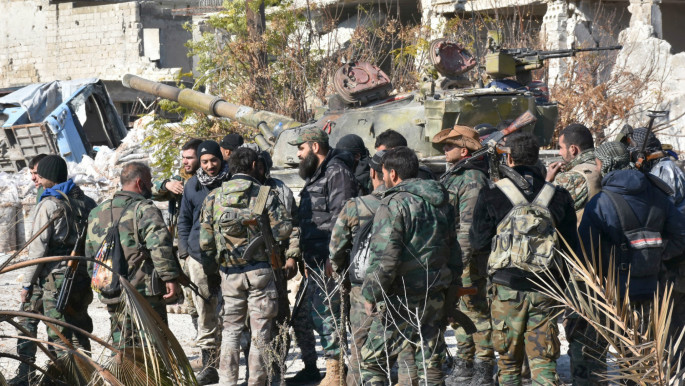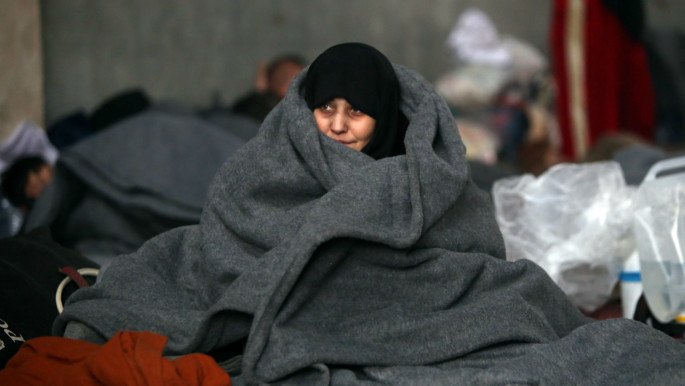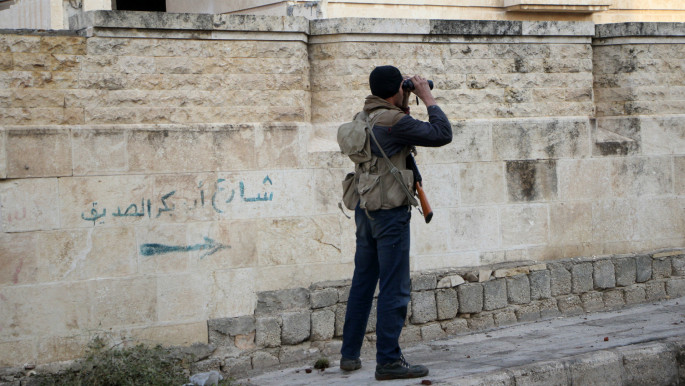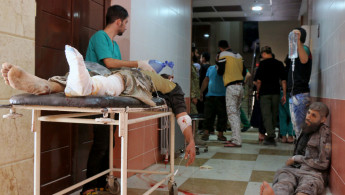Resilience and despair: East Aleppo residents witness city's annihilation
“Regime forces have advanced a lot in recent days. There is also heavy shelling, and street battles between regime and opposition forces in some areas,” said Ibrahim Abu al-Leith, of the Syrian Civil Defence, or “White Helmets” emergency response group.
“The situation is very desperate,” said Leith, speaking to The New Arab from East Aleppo.
Awaiting an uncertain fate
In recent weeks international powers and aid groups have increasingly called for a break in hostilities to deliver vital aid to East Aleppo. But, earlier this week, Russia and China vetoed a UN Security Council resolution calling for a ceasefire in the city.
As a result Leith and his neighbors in east Aleppo have been forced to continue living confronted by the daily threat of death.
More than 300 civilians have been killed in the past two weeks in a large-scale advance by regime forces and their allies, according to monitors.
Speaking on Wednesday, Leith said due to the blockade imposed on east Aleppo by Assad troops, the White Helmets had practically run out of fuel for their emergency response vehicles, greatly reducing the group’s capacity to tend to those in need of assistance.
“We simply cannot help all those in need,” said Leith.
In the past two weeks thousands of civilians have fled east Aleppo. Some have fallen victim to regime shelling in the process, with images of limp bodies and lifeless hands still clutching to worldly possessions broadcast on news bulletins.
 |
|
Troops loyal to Bashar al Assad now control over fifty percent of territory in east Aleppo previously controlled by rebel groups [AFP]
|
Additional reports have claimed that rebel forces have opened fire on residents attempting to leave the area, and continue to claim civilian lives in indiscriminate attacks on regime-controlled territory.
Speaking to The New Arab on Wednesday, Mohammad Abou Rajab, a medic based in east Aleppo, struck a similar tone to Leith, saying that those remaining medical staff in the east of the city were struggling to effectively treat those injured in the ongoing bombardment.
Since a US-Russian brokered ceasefire for Syria collapsed in mid-September, paving the way for an asserted regime assault on the city — victory in which is seen as crucial to winning the war — residents of east Aleppo have frequently told The New Arab, of ever-worsening conditions.
 |
We simply cannot help all those in need Ibrahim Abu al-Leith, spokesman for the Syrian Civil Defence |
 |
These are evident in the destruction of medical and educational facilities, water and electricity infrastructures; and a dearth in the availability of nutritious foods, potable water, and basic medicines, and even a lack of available spaces in existing graveyards to bury those recently killed.
In mid-November Abou Rajab told The New Arab that bombing campaigns over east Aleppo had rendered all of the area’s hospitals out of action.
As a result, he said medics had been forced to operate out of makeshift facilities, with limited electricity supplies, often in unsanitary conditions that led to heightened risk of bacterial infections during surgeries and treatments.
“It is devastating … there are also shortages of oxygen supplies, and various blood types,” said Abou Rajab on Wednesday, explaining that several wounded patients had died as a result of such shortages.
“The [city’s] infrastructure is being destroyed along with everything else: trees, buildings, and people. And it is happening with the awareness of the international community and the UN,” continued Abou Rajab.
“Our trust and hopes are with God.”
Exodus and abandonment
Around 31,000 people have fled East Aleppo to territory controlled by either the Syrian government in the west of the city or Kurdish forces in the northern Sheikh Maqsoud district in the past two weeks, reported Firas al-Khateeb, a UNHCR spokesperson in Syria. Monitors put the figure as high as 80,000.
UNHCR staff are present on the ground in regime-controlled territories delivering aid including food, water, and temporary shelter to those displaced from east Aleppo, said al-Khateeb.
However as many as 150,000 people remain under siege and confined to an ever-shrinking area as the Syrian army backed by allies including members of the Iranian Revolutionary Guards, the Lebanese Shia paramilitary group Hizballah, and Iraqi Shia militias, continue to advance.
Khateeb said the Syrian regime had, on paper, given the UNHCR permission to enter certain districts of east Aleppo and deliver aid as part of the UN organisation’s “Winter Plan” for aid relief in Syria.
However, the continued proliferation of violent conflict meant it remained too dangerous.
Abdulkami al-Hamdo, a teacher based in east Aleppo, said that residents felt abandoned by the international community.
Speaking to The New Arab in early November, al-Hamdo said that the deadly realities of life in east Aleppo had helped him foster stronger bonds with his students.
But speaking on Wednesday he said that school was no longer in session, the risks simply too great.
 |
| Thousands of east Aleppo residents have fled the area in the past two weeks amid advances by forces loyal to Bashar al-Assad [AFP] |
“We wake up in the morning feeling hungry and there is no food, just rice, uncooked, you don’t have clean water to drink, no warmth,” said al-Hamdo, who has an eight-month-old daughter.
“For me and my wife it is ok, but what about my daughter, other children? There are around 80,000 children in east Aleppo trapped here. There are teachers, doctors, media activists, charity workers, people helping orphans,” continued al-Hamdo.
“But in the eyes of the regime they are all terrorists and they are punished with death … the situation is inhumane, it is not even acceptable for animals.”
In addition to efforts undertaken by the UN, Save The Children is also desperately seeking access, through local partners, to deliver vital aid to East Aleppo. But, to no avail.
 |
We wake up in the morning feeling hungry and there is no food, just rice, uncooked, you don't have clean water to drink Abdulkami al-Hamdo, a teacher based in east Aleppo |
 |
“We have been trying to get aid to East Aleppo for months,” said Misty Buswell, Save The Children’s Communications Director for the Middle East and Eurasia.
Violations of international humanitarian law in Aleppo, and elsewhere in Syria, said Buswell, have been carried out with such regularity and impunity as to undermine the purpose of designating events “war crimes”, undermining the applicability of international humanitarian law in the process.
“In other places we see malicious intent but never with this level of firepower, if you look at Homs and Aleppo, they are like Dresden in Word War II — how do you rehabilitate this?"
"It is chilling, shocking, and we do not even really know how bad it is … the UN stopped counting the dead a long time ago,” said Buswell, who has worked in the humanitarian sector for twelve years.
“There is complete impunity, it defies belief.”
Diplomatic stalemates
Speaking on Wednesday, US Secretary of State John Kerry said that US officials had been in discussion with rebel groups over their possible evacuation from the area in order to prevent further bloodshed.
However, rebel groups remain reluctant to leave Aleppo, a city they have fought for control over for nearly six years.
Amin Malhees, a spokesman for the Army of Mujahedeen – a coalition of rebel factions that has received support from Washington – told The New Arab earlier this week that a rebel withdrawal from Aleppo was “unacceptable”.
He added that opposition forces remained capable of pushing back advances by regime troops, something analysts view as increasingly unlikely.
Ominously, with thousands of civilians caught in the crossfire, Russian Foreign Minister Sergei Lavrov has warned that those who refuse to leave East Aleppo on their own volition “will be wiped out”.
But speaking from East Aleppo, Abou Rajab said that many civilians were simply too scared to leave, whilst others clung to their fading hope of a Syria where Bashar al-Assad was no longer president.
 |
| Despite the stacking up of odds against them rebel groups remain reluctant to leave east Aleppo [AFP] |
Reports have emerged this week that some residents of east Aleppo accused of opposition ties and sympathies have been separated from family members and detained by regime authorities after having fled into regime controlled areas.
Meanwhile, video clips have emerged showing pro-regime forces seemingly looting homes in conquered districts of east Aleppo, and celebrating a decisive victory in the city as residents in rebel-controlled enclaves hunker down, increasingly troubled by what fate awaits them in the coming weeks.
Al-Khateeb said that locating safe spaces to “resettle” those displaced from east Aleppo was one of the UNHCR’s “main concerns”, noting that some facilities set aside for such a purpose had been damaged in recent conflict.
Abou Rajab, however plans to stay in east Aleppo, to continue to treat those in need as best he can.
“People here believed in freedom (hurriya), they do not want to leave,” said Abou Rajab (referring to a concept designating the realization of greater civil rights and liberties that united demonstrators across the Arab world during the so-called Arab Spring, some six years ago).
Before the Arab Spring, before the uprising and Assad’s brutal crackdown on dissent, Aleppo was regarded as one of the world’s most beautiful cities.
Now, in the words of one high-ranking UN official, it has become a “graveyard”.
Abou Rajab’s words were punctuated by the deadly thud of aerial munitions hitting their target.
“I will stay here until the last moment.”
Martin Armstrong is a journalist with The New Arab. You can follow him on Twitter here.


![President Pezeshkian has denounced Israel's attacks on Lebanon [Getty]](/sites/default/files/styles/image_684x385/public/2173482924.jpeg?h=a5f2f23a&itok=q3evVtko)



 Follow the Middle East's top stories in English at The New Arab on Google News
Follow the Middle East's top stories in English at The New Arab on Google News


